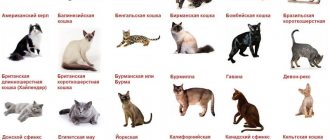Reasons for kittens meowing
Kittens, being unable to cope with many problems on their own, often request human help. The reasons may be as follows :
- Stressful state when weaning from mother and changing a familiar place. Finding a new family dooms the kitten to severe stress, anxiety, and searching for a mother cat. It is necessary to show him increased attention and surround him with care the entire first time.
- Hunger. A growing body constantly requires food, so the kitten will meow often for this reason.
- Request for help. During the game, the kitten may end up in a place where it cannot escape. In such cases, he begins to call for help.
- Attention. Most often, the baby will seek attention late in the day. It’s worth petting the kitten, but you shouldn’t run at the first call every time for educational purposes.
- Expression of love.
Hiss
When a cat hisses and even growls, this does not mean that she is angry - most likely, she is scared and thus trying to defend herself. Your pet may hiss at a stranger who comes into your home (or, for that matter, someone he knows but just doesn't like), or even at another cat, warning him that he must “step back.” The cat ends up showing everyone who's boss (hint: it's not you).
“If you can,” advises Animal Planet, “ignore the hiss. Don't yell at her or confuse her." Just wait a little, after that it will stop hissing. Give your pet the space she needs to calm down and she will feel safer.
Adult cats
There are several main reasons responsible for cats meowing:
- The most common reason is the desire to eat. The cat attracts attention with its loud, insistent voice and indicates impending hunger. .
- An attempt to attract human attention. The lack of other ways of conversation forces one to say “meow” when the animal wants to receive a small portion of affection and care. Don’t ignore a cat that stubbornly climbs onto your lap or lies down on your keyboard.
- Greetings. Cats love to greet their owners with their meows, and some say “meow” almost all the time when they see their loved one.
- The desire to go to the toilet. Cats often notify their owners not only before they relieve themselves, but also after.
- Please open the door. Cats hate it when the door is slammed. If you let the cat in, but close the door again, he will definitely ask to leave. Therefore, if you have a cat, you need to keep the doors open.
- Feeling pain. It is worth carefully touching the animal. If the cat meows when pressing on a specific place, you need to consult a doctor. You should not pick up a mature animal by the scruff of the neck: this can damage the vertebrae.
- Sexual activity. The volume and duration of this “meow” cannot be confused with anything else. The cat begins to lift its hindquarters and rub itself. If you do not want to breed offspring, then you should spay or neuter your pet. These measures will save the animal from constant suffering and possible diseases.
Other causes of meowing
There are several other reasons why a cat meows:
- Meowing can mean fear. When under stress (a car ride, a visit to the veterinarian, moving to a new place of residence), the animal experiences anxiety and attracts attention.
- Aggression. Being aggressive, the cat usually emits a warning “meow”. At such a moment, you need to stay as far away from the cat as possible.
- Expression of pleasure while playing.
- Loneliness. Left to their own devices after their owner leaves for work, cats may feel sad. To avoid this, you should keep several pets.
- The desire to go outside. A kitty may scratch under the door and meow if she is tired of being locked up.
- Dissatisfaction with the food offered. A spoiled animal, which is very picky about its diet, reports its disagreement with the proposed diet. If a cat meows after eating, the diet was chosen incorrectly and causes him discomfort.
- Please remove the tray. The cat may be dissatisfied with the cleanliness of the toilet.
- Hunting time. Cats often make meowing sounds when they see but are unable to catch prey.
- Pregnancy. If a cat meows and crawls under the blanket, then most likely she is preparing to give birth.
What does meowing mean?
Here is just a small dictionary of cat “meows” 1. A short “mur-meow” when meeting you is a greeting. If you have been at home for a long time and there is no reason to greet you, then such a sound speaks of disappointment and boredom. 2. If a cat, meowing pitifully, follows you on your heels, he is in dire need of attention. 3. A drawn-out “meow” - a demand and attraction of attention. So the pet can ask to be held, or remind you that it’s time to eat. 4. A longer, high-pitched meow is a cry for help. Hear it if the cat is sick or upset. 5. If the “meow” is short and low, then you know that you have received a reprimand. This is how the pet expresses its disappointment or resentment. 6. When a cat sees prey that it cannot catch for some reason, it begins to chirp. You've probably noticed this sound in your pet when he sits on the windowsill and sees a bird behind the glass. That sounds like disappointment. 7. By hissing, your cat warns that she is aggressive. It's better not to provoke her in this state of mind. 8. Something between a purr and a meow is called a trill. This sound indicates a good mood. The cat is glad to see you, you pleased the fluffy one, and he liked his lunch. 9. When a cat comes up to you, looks you in the eye and makes a short sound like a squeak, it wants to attract attention. She seems to say: “I beg your pardon...”. Perhaps she wants to sit in your arms. 10. The most pleasant thing you can hear from a pet is purring. At such a moment the cat is happy. But sometimes such a sound is a sign of fear, stress or pain. This is how the pet tries to calm itself down.
There are cats who love to chat with people at their leisure, and sometimes there are shy guys whose owners are not sure that the pet even has a voice. In any case, if your pet behaves differently than usual (too quiet, or suddenly became very talkative), do not ignore it - perhaps he is sick and needs your help.
Various products for cats and kittens
Elderly cats
Older animals begin to show new reasons for meowing as they age. Some of them should not cause concern, while others deserve special attention:
- Inability to make independent choices. Closer to old age, a cat increasingly relies on its owner in its decisions. Sometimes it is difficult for her to decide what needs to be done right now, and she is waiting for advice.
- Increased need for affection. In old age, cats need more care and often pester their owners at night. Here all that remains is to come to terms with your beloved animal.
- Manipulation. Pets often use their owner for their needs.
Purr
After a busy day at work, you feel happier when your cat snuggles up to you, sniffs and purrs. Like oh, purring is like how blind and deaf kittens communicate with their mother, but all cats use this means of communication throughout their lives, even with you. Pay close attention to your cat's purrs and you'll notice subtle changes in tone and vibration, all of which indicate that your cat is happy and well.
A lesser-known meowing motif: cats can use these sounds to calm themselves when they're scared, so don't forget to show her some love when you hear her "little motor."
Health reasons
In addition to simple situations that any owner can cope with, there are dangerous ones that threaten the pet’s health:
- Infection with worms. Most often, kittens are susceptible to it. In addition to general malaise and plaintive meowing, you may notice trembling and bowel movements.
- Diseases of the urinary or digestive system. Emptying the bladder and bowels accompanied by meowing is a reason to sound the alarm. You should also check your stool and urine for blood.
- Spinal injury. Loud screams are accompanied by weak trembling of the whole body.
- Mites or allergies. The cat jumps around the apartment, shaking its head, itching and meowing constantly.
- Viral infections, indicated by hoarse meows.
Howl
If you think that only dogs howl, you are mistaken! The American Society for the Prevention of Cruelty to Animals (ASPCA) notes that some cat breeds, especially Siamese, meow and scream too often. Any cat that has not yet mated with a male cat will scream to attract a partner.
If your cat doesn't meet these criteria, she may howl because she's in trouble—perhaps trapped somewhere, or even injured. In other cases, the cat howls because she wants you to quickly come to her and see the prey she brought you (and this is not always a toy). In any case, pay attention to your “screamer” to make sure that everything is okay with him.
Signs
These beautiful and noble animals have always been associated with witchcraft, so there are a lot of interesting beliefs around them. Some of them also concern meowing:
- The constant meowing of a cat portends huge troubles.
- A cat meowing through the window, waking up the owners, brings good news and prophesies the appearance of a baby in the near future.
- Meowing at a wedding foretells unhappiness in marriage.
- The loud meowing of a frightened cat, trying to hide and asking to come out, means a natural disaster: earthquakes, tornadoes, eruptions, floods.
- A loud “meow” on the road is a sign of trouble on the road.
Cats' ability to predict the weather is due to their extraordinary sense of smell.
Smart cats have long understood all the delights of living together with humans. They often manipulate us using meows. If a person constantly pays attention to a cat’s requests, then the animal will do this much more often, without being guided by any reasons. This is how cats try to communicate with people, experiencing pleasant emotions when we enjoy the attention shown.
Prohibited actions
To prevent your life together with your cat from turning into hell, it is important to understand that she needs attention, affection and your love. That being said, you need to be aware of some actions that can cause problems between you, in particular, constant meowing:
- Lack of rules of behavior and little training.
- Periodic permission to violate established rules.
- Pampering.
- Lack of attention.
- Neglect of communication and games with animals.
- Long trips during which the animal is left at home alone.
- Too strict punishments, physical punishments.
- Punishments for meowing. If you think cats are meowing for no reason, it's important to understand why they're doing it—maybe they're in pain or they're stressed.
- Reacting to meowing. The more you respond to meowing, the more the cat will do it, so if this annoys you, feed and pet the animal only during quiet pauses. This advice is not relevant if you are a lonely person and talking with your pet is a joy for you.
The pet is sick
Meowing is one way for cats to communicate that they are not feeling well. Often this behavior is accompanied by bad behavior. Constant meowing can indicate pathologies of the thyroid gland, kidney disease, problems with urination and many other health problems. If your cat has not behaved this way before, you should consult a veterinarian.
“Waiting for you”, “beware” and “hurray”: what cats meow to each other
But, no matter how much we would like to think that the purrs recognized us as exclusive interlocutors, this would be too presumptuous. Those who believe that cats meow only for people, for some reason forget that kittens, as mentioned above, meow when communicating with their mother, and she answers them.
Tailed animals also produce a very loud and shrill meow during the mating season - each of us has heard these “March songs”. Cats meow, hiss and howl before an attack, warning the enemy, and during the fight itself. Finally, a short and loud combat “meow”, something like our “hurray!”, a cat can emit from the moment of hunting or playing, unable to restrain its emotions.
So cat “words” are not only a property acquired by mustachios during the process of evolution for the purpose of survival, but also a means of communication, exchange of information and expression of their emotions. Try talking to your cat - she probably has something to tell you!
Dog barking
Dog barking is mostly intended for the human ear and carries some kind of message. As for barking for no reason, this is either a sign of poor upbringing or a breed trait. But, in any case, this is a reaction to a certain stimulus.
The closest relatives of dogs, wolves, do not bark in nature, but only howl. Therefore, scientists came to the conclusion that barking is an acquired trait that arose in dogs during the breeding process.
The main reasons for dog barking:
- Manifestation of the protective instinct. In this case, the dog barks whenever he sees strangers approaching or hears rustling sounds.
- Longing and boredom. Dogs often bark, howl and whine when left alone at home. If your pet has such a habit, then it needs to be stopped as early as possible, especially at night.
- Thirst for attention. An attempt to attract the owner's attention often turns into a bad habit, and the dog begins to bark for any reason and even without it. In a poorly trained dog, barking can be a method of manipulation.
- Disease. Constant and monotonous barking may be a sign of illness.
- A game. Dogs almost always bark while playing, and this is a sign of joy and delight.
- Stress. Ingoda dogs bark when experiencing stress, fear or anxiety.
- Features of the psyche. Dogs of small and dwarf breeds react to any irritant with hysterical barking. The reason is mental instability and poor socialization.
You should know that adult dogs that do not have problems usually do not bark. Barking is always a signal about something. Therefore, under no circumstances should you ignore the dog. who barks constantly. Otherwise, it will become a habit for him and it will be difficult to get rid of it.
Tweet
This is one of the strangest sounds made by cats in exceptional cases. Often, a pet may chirp or tremble when it sees a bird, squirrel or rabbit outside the window to warn its owners. According to the Humane Society, it's not a full-fledged "meow" but rather a command for kittens who learn while still very young, and mom uses the sound to keep her kids in line. If you have multiple cats, you may also hear them talking to each other. Finally, the cat performs this “trick” to get you to go to her food bowl or go to bed.
Paying close attention to these cat sounds will create even more of a bond between you and your furry friend, and you'll be able to better understand what your cat wants and give her everything she needs to feel happy, healthy, and safe.
Why do cats meow at people?
In nature, they need their voice mainly when searching for a partner and interacting with kittens. In communication with a person
cats often
meow
because they perceive us as a mother who is responsible for their nutrition and comfort. They can also use similar sounds to talk to other animals, such as dogs.
Interesting materials:
What is the difference between a gynecologist and a gynecologist endocrinologist? What is the difference between a deep bikini and a total bikini? What is the difference between hotel business and hotel service? What is the difference between state and municipal service? What is the difference between GP 7 and GP7v? What is the difference between influenza and acute respiratory infections? How is the flu different from a cold? What is the difference between Goop and Moop? What is the difference between a nail and a self-tapping screw? What is the difference between a shortcut and real files?











